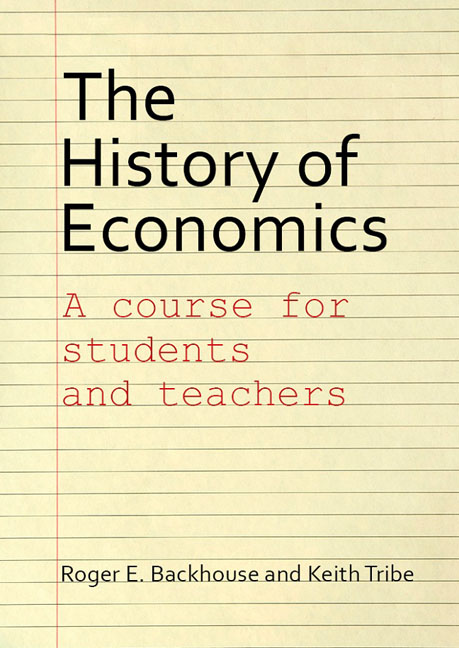Book contents
- Frontmatter
- Contents
- Introduction
- Lecture 1 Commerce, Wealth and Power: The Disputed Foundations of the Strength of a Nation
- Lecture 2 Natural Order, Physiocracy and Reform
- Lecture 3 Adam Smith I: Outline of a Project
- Lecture 4 Adam Smith II: The Two Texts
- Lecture 5 The Political Economy of Malthus and Ricardo
- Lecture 6 Political Economy in Continental Europe and the United States
- Lecture 7 Political Economy, Philosophic Radicalism and John Stuart Mill
- Lecture 8 Popular Political Economy: List, Carey, Bastiat and George
- Lecture 9 Radical Political Economy: Marx and His Sources
- Lecture 10 Marginalism and Subjectivism: Jevons and Edgeworth
- Lecture 11 From Political Economy to Economics
- Lecture 12 Alfred Marshall’s Project
- Lecture 13 Markets and Welfare after Marshall
- Lecture 14 Monetary Economics
- Lecture 15 The Rise of Mathematical Economics
- Lecture 16 Robbins’s Essay and the Definition of Economics
- Lecture 17 John Maynard Keynes
- Lecture 18 Quantitative Economics
- Lecture 19 The Keynesian Revolution
- Lecture 20 Modern Macroeconomics
- Lecture 21 Inflation and the Phillips Curve
- Lecture 22 Popular Economics
- Lecture 23 Economics and Policy
- Lecture 24 Ideology and Place
- Index
Lecture 12 - Alfred Marshall’s Project
Published online by Cambridge University Press: 09 August 2023
- Frontmatter
- Contents
- Introduction
- Lecture 1 Commerce, Wealth and Power: The Disputed Foundations of the Strength of a Nation
- Lecture 2 Natural Order, Physiocracy and Reform
- Lecture 3 Adam Smith I: Outline of a Project
- Lecture 4 Adam Smith II: The Two Texts
- Lecture 5 The Political Economy of Malthus and Ricardo
- Lecture 6 Political Economy in Continental Europe and the United States
- Lecture 7 Political Economy, Philosophic Radicalism and John Stuart Mill
- Lecture 8 Popular Political Economy: List, Carey, Bastiat and George
- Lecture 9 Radical Political Economy: Marx and His Sources
- Lecture 10 Marginalism and Subjectivism: Jevons and Edgeworth
- Lecture 11 From Political Economy to Economics
- Lecture 12 Alfred Marshall’s Project
- Lecture 13 Markets and Welfare after Marshall
- Lecture 14 Monetary Economics
- Lecture 15 The Rise of Mathematical Economics
- Lecture 16 Robbins’s Essay and the Definition of Economics
- Lecture 17 John Maynard Keynes
- Lecture 18 Quantitative Economics
- Lecture 19 The Keynesian Revolution
- Lecture 20 Modern Macroeconomics
- Lecture 21 Inflation and the Phillips Curve
- Lecture 22 Popular Economics
- Lecture 23 Economics and Policy
- Lecture 24 Ideology and Place
- Index
Summary
Aims of the lecture
1. To outline the three main elements of Marshall’s “project” for a modern economics: the writing of a central text, the establishment of a specialist journal, and the creation of the first three-year undergraduate degree in economics.
2. To demonstrate that his influence ran not only through these institutional innovations, but through the students that he taught.
3. To show that his ambition for economics – that it become a central part of the training of businessmen, administrators and civil servants – had more mixed, and delayed, success.
Bibliography
Principles of Economics as published in 1890 was planned as the first of two volumes, but Marshall eventually dropped “Vol. I” from the title page and published the material he had assembled for the second volume in two books: Industry and Trade: A Study of Industrial Technique and Business Organization; And of Their Influences on the Conditions of Various Classes and Nations (London: Macmillan, 1919); and Money, Credit & Commerce (London: Macmillan, 1923). Principles itself went through several editions: a second edition in 1891 up to an eighth in 1920, the last in Marshall’s lifetime. In the process it was revised and rearranged; here we are chiefly concerned with outlining the originality of Principles, so reference will be exclusively to the first edition of 1890. While physical copies of this edition are rare, an electronic version is available through archive.org. There is no definitive edition apart from the variorum (ninth) edition prepared by Claude Guillebaud and published in 1961, based on the eighth edition. Marshall also published a condensed version of the second edition under the title Elements of Economics of Industry (London: Macmillan, 1892) which should not be confused with his and Mary Paley Marshall’s Economics of Industry (1879), which it was designed to replace.
Marshall’s writings prior to 1890 have been collected in The Early Economic Writings of Alfred Marshall 1867–1890, two volumes (London: Macmillan, 1975), edited by John Whitaker; Whitaker also edited a three-volume collection of correspondence (Cambridge: Cambridge University Press, 1996). The book written with his wife Mary, The Economics of Industry (1879), is significant in part by virtue of it having been commissioned for use in Cambridge University extension lectures, and so can be regarded as the first textbook specifically composed for use in the teaching of economics in Britain.
- Type
- Chapter
- Information
- The History of EconomicsA Course for Students and Teachers, pp. 185 - 198Publisher: Agenda PublishingPrint publication year: 2017



